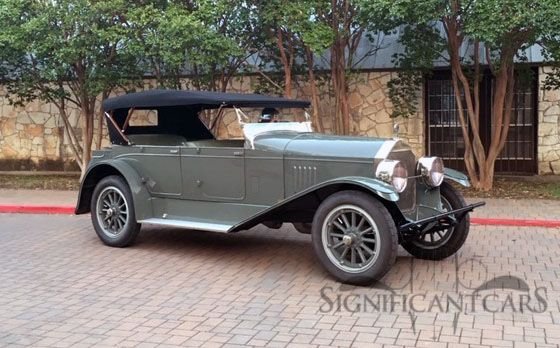Drivetrain
Chassis
Body
One Off Custom:Lebaron Coachwork Known History Important Car
The forerunner of Pierce-Arrow was established in 1865 as Heinz, Pierce and Munschauer. The company was best known for its household items, especially its delicate, gilded birdcages. In 1872, George Norman Pierce (1846–1910) bought out the other two principals of the company, changed the name to the George N. Pierce Company, and in 1896 added bicycles to the product line. The company failed in its attempt to build a steam-powered car in 1900 under license from Overman, but by 1901, had built its first single-cylinder, two-speed, no-reverse Motorette. In 1903, it produced a two-cylinder car, the Arrow.
In 1904, Pierce decided to concentrate on making a larger, more luxurious car for the upscale market, the Great Arrow. This became the company's most successful product. The solidly built, four-cylinder car won the Glidden Tour in 1905, an endurance run to determine and celebrate the most reliable car. Thirty-three cars entered the 350-mile race from New York City to Bretton Woods, New Hampshire; the race was won by Percy Pierce in a Great Arrow.
The noted industrial architect Albert Kahn designed the Pierce Arrow Factory Complex at Elmwood Avenue and Great Arrow Avenue in about 1906. It was listed on the National Register of Historic Places in 1974. George Pierce sold all rights in the company in 1907, and he died three years later. In 1908, Pierce Motor Company was renamed as the Pierce-Arrow Motor Car Company.
In 1909, U.S. President William Howard Taft ordered two Pierce-Arrows (and two White Model M Tourers) to be used for state occasions, the first official cars of the White House. In 1910, Pierce dropped its other 4-cylinder models and focused exclusively on 6-cylinder cars. The model 6-36, 6-48, and 6-66 continued for the next decade. Starting in 1918, Pierce-Arrow adopted a four-valve per cylinder T-head inline-six engine (Dual Valve Six) and three spark plugs per cylinder, one of the few, if only, multi-valve flathead design engines ever made.
In 1910, George Pierce died. In 1912, Herbert M. Dawley (later a Broadway actor-director) joined Pierce-Arrow, and he designed almost every model until 1938. Until 1914, Pierce-Arrow also made a line of motorcycles, including the Pierce Four.
The Pierce-Arrow was a status symbol, owned by many Hollywood stars and tycoons. Most of the royalty of the world had at least one Pierce-Arrow in its collection. Some have described Pierce and two of its rivals among American luxury cars, Peerless and Packard, as the "Three P's of Motordom." Industrial efficiency expert Frank Gilbreth extolled the virtues of Pierce-Arrow, in both quality and in its ability to safely transport his large family. Its wheelbase was 12 ft 3 in (3.73 m). The transmission was a four speed manual in 1919. Actor Sessue Hayakawa (famed for his role in Bridge on the River Kwai) drove a custom-ordered gold-plated Pierce-Arrow. A restored 1919 Pierce-Arrow is on display at the Woodrow Wilson Presidential Library. An open-bodied Pierce-Arrow carried Woodrow Wilson and Warren G. Harding to Harding's 1921 inauguration, and one was used prominently in the 1950s movie Cheaper by the Dozen.
This special Custom Bodied Model 33 was ordered by Frank Goodyear Jr., a Buffalo NY Industrialist with businesses in Lumber and Railroading. Mr. Goodyear selected the fledgling LeBaron Coachbuilders which was formed by Raymond Dietrich and Thomas Hibbard after leaving Brewster in 1920. The car was ordered through Demarest and Company since prior to LeBaron's merger with Bridgeport Body Company in 1924, Le Baron was not properly equipped to build its own bodies. As a fledgling concern, Mssrs. Hibbard and Dietrich would write articles for Publications such as Town And Country, Country Life, and Vanity Fair highlighting their products since paid advertisements were out of their reach. Once such article featuring this very car was published in the August 1923 Issue of Vanity Fair. Mr. Goodyear was killed in an automobile accident in 1930 driving his Rolls Royce-also bodied by LeBaron interestingly-the car then passed to Earl J. Broyles- a Supermarket Owner.
In 1959 the car was found in a Tobacco Barn in Fredericksburg, VA by Eugene C Gordon. Mr. Gordon spent a lot of time researching the car and returned the car to its original livery as featured in Vanity Fair, repainting the car its original Blue/Green Color, and reupholstering the interior as well. He found that the car was driven by a young politician named Franklin Delano Roosevelt under Mr. Goodyear's ownership, and that this is believed to be the earliest surviving example of Raymond Dietrich's design efforts. Mr. Gordon supplied the car for the 1983 Movie Chiefs starring Charlton Heston, and was photographed in the car in the Charlotte Observer article promoting the film. The car was featured on the cover of the Pierce Arrow Society publication The Arrow Series 86 Model 4. After 26 years as a faithful custodian Mr. Gordon sold the car to PAS member Merle Smith, who sold the car to the Seller in 2013.
The car remains in largely original condition save the repaint and reupholstery in the late 50's, to return the car to its original color scheme. Featuring the rare “New York” Headlights, Artillery Wheels, Dual Rear Spares, a Steel Trunk, Beautiful Walnut Cabinetry, Full Leather Seating, and an unusually rakish Windscreen for the period, this car has a presence that transcends any other Model 33 we have encountered. The car presents extremely well cosmetically and runs and drives without fault. Here is a very important piece of Pierce Arrow and LeBaron history that one can drive and enjoy immediately. This is certainly a rare opportunity to acquire a truly honest, well preserved and bespoke example of the Finest American Auto Manufacturing had to offer in the early 20's.


























































































